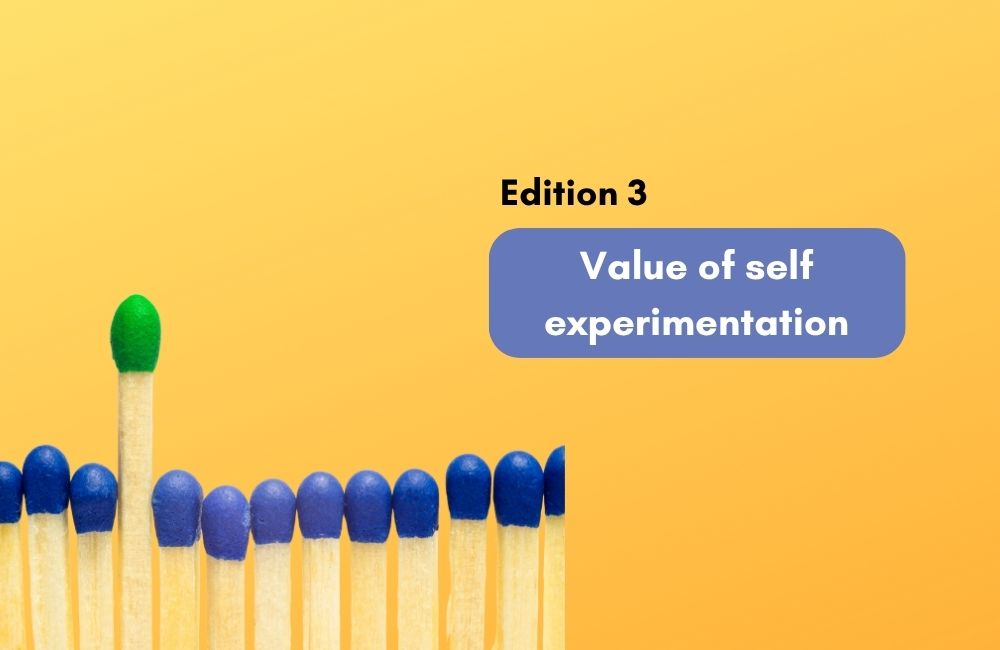
Welcome to edition 3 of Curiositea – our monthly newsletter; as always backed by evidence, short (3-5 mins to read) and something you can start implementing right away!
We decided this time to focus on the value of personal experimentation.
Let’s unpack this: what does personal experimentation do for us, really?
1. It Disrupts Autopilot
We are creatures of habit. Research shows that roughly 40–45% of our daily behavior is habitual. That’s great for efficiency, but terrible for growth.
When you try something new, you wake up your brain. Suddenly, the cognitive lights flicker on. You’re noticing, evaluating, adjusting. That mental engagement leads to better focus, presence, and awareness – wouldn’t you like that?
2. It Builds Cognitive Flexibility
Doing everyday things differently forces your brain to re-wire. It’s like cross-training for your neurons. Studies show that varying your routine enhances neuroplasticity—your brain’s ability to form new connections. This boosts problem-solving, creativity, and even emotional regulation.
In other words: experiment with your lunch, and you just might get better at handling that difficult colleague.
3. It Inoculates You Against Failure
When you experiment, you’re supposed to not know how it’ll go. That subtle shift—from expecting success to expecting feedback—is powerful. It reduces perfectionism, builds resilience and rewires your relationship with risk. An NLP teacher once had one of us practise walking into the neighbourhood juice shop and asking for a copy of the latest bestselling book. Sounds strange but made a big difference to how I perceived social failure in the future.
You start to see mistakes as data, not disasters.
4. It Fuels Creativity
Ever wonder why some of your best ideas come in the shower or on a walk? Novelty stirs the pot. Trying new things floods your brain with dopamine, the neurotransmitter of pleasure, motivation, and learning. Even tiny shifts—writing with your non-dominant hand, listening to a genre you “hate,” cooking something blindfolded (okay maybe don’t) can enhance divergent thinking, a key marker of creativity.
5. It Enhances Self-Awareness
When you break a routine, you start to notice what was hidden:
- “Wow, I always start the day stressed when I scroll Instagram.”
- “Turns out I’m not bad at small talk—I just needed to practice.”
- “I actually like working in cafes more than I thought.”
These micro-experiments are like mirrors—showing you blind spots, preferences, hidden talents.
So join us and spend the next month trying a few Micro-Experiments.
Step one: Find new things to try
Some examples to get your brain fizzing
- Ask someone you don’t like some questions about their life
- Read poetry the first thing every morning (instead of the news)
- Walk backwards for five minutes after dinner
- Wear a color you usually avoid
- Do one task at 80% effort and notice what happens to your stress levels.
- If you usually sit alone at lunch, invite someone to join you.
- If you prefer to mail clients, pick up the phone on them.
- Come home using a different mode of transport
- Use film characters in your presentation
The point isn’t to do these things well—it’s to mess with the pattern.
Step two: Track how you feel
Do the new thing every day for a week. After a week, make a report to yourself on the changes that may have come about from these tweaks to your habits. Have they impacted relationships, your inner state, how you see yourself? What do we gain when we move out of status quo?
Keep the experiment going for the next week or pivot. You could also introduce this idea for your team or family to try together.
Here’s a sample worksheet to help you keep track –
Haffun. And write back to us and tell us what you tried!